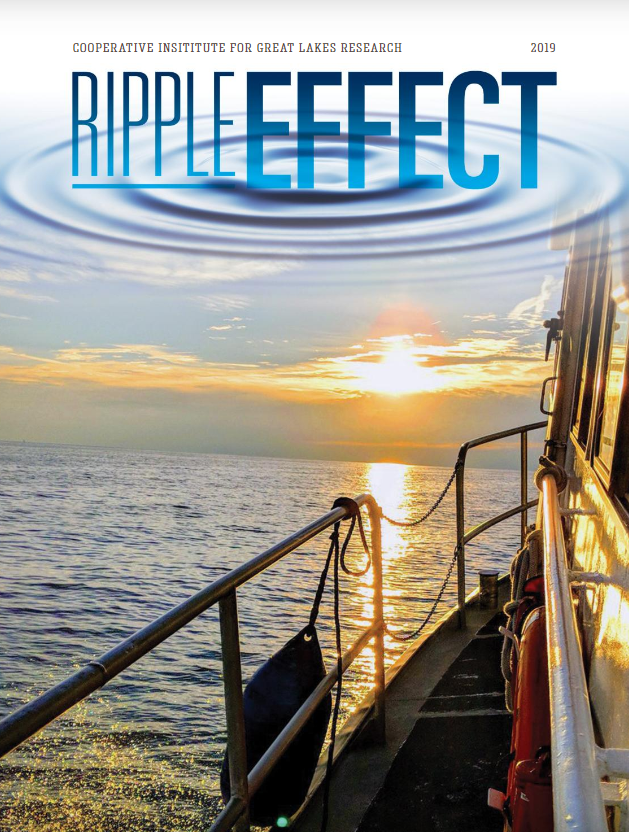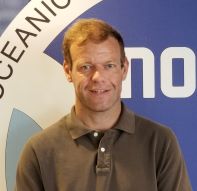Summer 2019 eNewsletter
Summer Announcements
CIGLR Energizes Great Lakes Partnerships with 3rd All Partners Meeting
 Each year, the Cooperative Institute for Great Lakes Research invites its Regional Consortium partners to NOAA GLERL for a 1.5-day meeting that aims to coordinate research goals and foster new research partnerships. More than 80 representatives from the CIGLR Research Institute, CIGLR Regional Consortium, and NOAA GLERL met September 24-25, 2019. The meeting agenda included introductions to new Regional Consortium members, pathways to interactions with private-sector partners, success stories from recent Consortium collaborations, and an overview of NOAA GLERL research challenges and opportunities. Collaborative research results, including those from CIGLR-funded students and postdoctoral fellows, were given during a poster session.
Each year, the Cooperative Institute for Great Lakes Research invites its Regional Consortium partners to NOAA GLERL for a 1.5-day meeting that aims to coordinate research goals and foster new research partnerships. More than 80 representatives from the CIGLR Research Institute, CIGLR Regional Consortium, and NOAA GLERL met September 24-25, 2019. The meeting agenda included introductions to new Regional Consortium members, pathways to interactions with private-sector partners, success stories from recent Consortium collaborations, and an overview of NOAA GLERL research challenges and opportunities. Collaborative research results, including those from CIGLR-funded students and postdoctoral fellows, were given during a poster session.

CIGLR 3rd Annual Partner Meeting, September 25, 2019.
articipants included representatives from the Cleveland Water Alliance, Fondriest Environmental, Great Lakes Observing System, LimnoTech, Michigan Environmental Council, National Wildlife Federation Great Lakes Regional Center, NOAA Great Lakes Environmental Research Laboratory, NOAA National Geodetic Survey, The Nature Conservancy Great Lakes Division, Central Michigan University, Cornell University, Grand Valley State University, Lake Superior State University, Michigan State University, University of Michigan, Michigan Technological University, Ohio State University, University of Minnesota Duluth, University of Windsor, University of Wisconsin Milwaukee, and Wayne State University.
“I am excited about the new era of sustainable resource management that is being built right now-an era that is based on partnerships among great organizations who work together for the good of all who call the Great Lakes their home,” said CIGLR Director Dr. Brad Cardinale.
CIGLR Introduces New Annual Magazine: Ripple Effect
 This year, CIGLR is proud to announce the publication of our first annual magazine, Ripple Effect. This issue provides research updates, discusses our program results, and introduces new staff, students and fellows. “The ripple effect is analogous to how CIGLR works to join individual research projects, educational efforts, and management programs to multiply and spread their impact throughout the Great Lakes as a whole. I hope you enjoy the inaugural version of Ripple Effect. This collection of stories shows how we are working together to Keep the Great Lakes Great!” says Dr. Bradley Cardinale, CIGLR Director.
This year, CIGLR is proud to announce the publication of our first annual magazine, Ripple Effect. This issue provides research updates, discusses our program results, and introduces new staff, students and fellows. “The ripple effect is analogous to how CIGLR works to join individual research projects, educational efforts, and management programs to multiply and spread their impact throughout the Great Lakes as a whole. I hope you enjoy the inaugural version of Ripple Effect. This collection of stories shows how we are working together to Keep the Great Lakes Great!” says Dr. Bradley Cardinale, CIGLR Director.
If you are interested in a print version of the magazine, please contact CIGLR at: [email protected].
CIGLR welcomes two new members to our team!

Dr. Michael Fraker recently joined CIGLR as an Assistant Research Scientist. His research develops predictive models that link biological to physical processes in aquatic ecosystems. Currently, he is focusing on Lake Erie, and the interactions between piscivores, larval fish, and zooplankton. By using a variety of approaches (observational, experimental, computational/mathematical), Dr. Fraker works to develop a coherent and mechanistic understanding of ecological systems.

Dr. Yi Hong is a CIGLR hydrological modeler collaborating with NOAA GLERL and the National Center for Atmospheric Research (NCAR) in Boulder, Colorado, to develop and test hydrodynamic and wave models for the Great Lakes. Yi Hong previously worked as a postdoctoral fellow at the Ecole des Ponts ParisTech in France, where he focused on water quantity and quality modeling at various scales, as well as the development of real-time forecasting systems.
